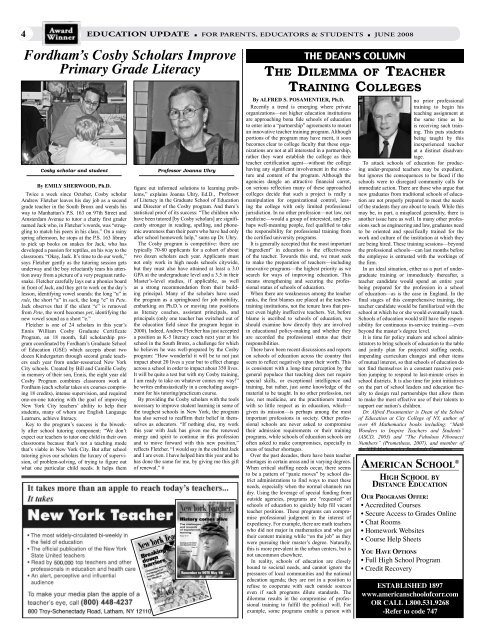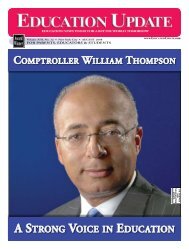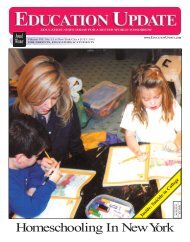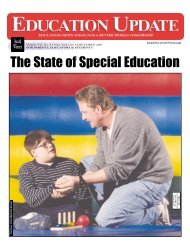You also want an ePaper? Increase the reach of your titles
YUMPU automatically turns print PDFs into web optimized ePapers that Google loves.
4 <strong>Education</strong> update ■ For Parents, Educators & Students ■ JUNE 2008Fordham’s Cosby Scholars ImprovePrimary Grade LiteracyCosby scholar and studentBy Emily Sherwood, Ph.D.Twice a week since October, Cosby scholarAndrew Fletcher leaves his day job as a secondgrade teacher in the South Bronx and wends hisway to Manhattan’s P.S. 163 on 97th Street andAmsterdam Avenue to tutor a chatty first gradernamed Jack who, in Fletcher’s words, was “strugglingto match his peers in his class.” On a rainyspring afternoon, he stops at the P.S. 163 libraryto pick up books on snakes for Jack, who hasdeveloped a passion for reptiles, on his way to theclassroom. “Okay, Jack. It’s time to do our work,”says Fletcher gently as the tutoring session getsunderway and the boy reluctantly tears his attentionaway from a picture of a very pregnant rattlesnake.Fletcher carefully lays out a phonics boardin front of Jack, and they get to work on the day’slesson, identifying vowel sounds: the long “u” inrule, the short “a” in sack, the long “e” in Pete.Jack observes that if the silent “e” is removedfrom Pete, the word becomes pet, identifying thenew vowel sound as a short “e.”Fletcher is one of 24 scholars in this year’sEnnis William Cosby Graduate CertificateProgram, an 18 month, full scholarship programcoordinated by Fordham’s Graduate Schoolof <strong>Education</strong> (GSE) which accepts about twodozen Kindergarten through second grade teacherseach year from under-resourced New YorkCity schools. Created by Bill and Camille Cosbyin memory of their son, Ennis, the eight year oldCosby Program combines classroom work atFordham (each scholar takes six courses comprising18 credits), intense supervision, and requiredone-on-one tutoring with the goal of improvingNew York City teachers’ ability to help theirstudents, many of whom are English LanguageLearners, achieve literacy.Key to the program’s success is the biweeklyafter school tutoring component: “We don’texpect our teachers to tutor one child in their ownclassrooms because that’s not a teaching modethat’s viable in New York City. But after schooltutoring gives our scholars the luxury of supervision,of problem-solving, of trying to figure outwhat one particular child needs. It helps themProfessor Joanna Uhryfigure out informed solutions to learning problems,”explains Joanna Uhry, Ed.D., Professorof Literacy in the Graduate School of <strong>Education</strong>and Director of the Cosby program. And there’sstatistical proof of its success: “The children whohave been tutored [by Cosby scholars] are significantlystronger in reading, spelling, and phonemicawareness than their peers who have had onlyafter school homework help,” sums up Dr. Uhry.The Cosby program is competitive: there aretypically 70-80 applicants for a cohort of abouttwo dozen scholars each year. Applicants mustnot only work in high needs schools citywide,but they must also have attained at least a 3.0GPA at the undergraduate level and a 3.5 in theirMaster’s-level studies, if applicable, as wellas a strong recommendation from their buildingprincipal. Many of the scholars have usedthe program as a springboard for job mobility,embarking on Ph.D.’s or moving into positionsas literacy coaches, assistant principals, andprincipals (only one teacher has switched out ofthe education field since the program began in2000). Indeed, Andrew Fletcher has just accepteda position as K-5 literacy coach next year at hisschool in the South Bronx, a challenge for whichhe believes he was well-prepared by the Cosbyprogram: “How wonderful it will be to not justimpact about 20 lives a year but to effect changeacross a school in order to impact about 350 lives.It will be quite a test but with my Cosby training,I am ready to take on whatever comes my way!”he writes enthusiastically in a concluding assignmentfor his tutoring/practicum course.By providing the Cosby scholars with the toolsnecessary to improve student learning in some ofthe toughest schools in New York, the programhas also served to reaffirm their belief in themselvesas educators. “If nothing else, my workthis year with Jack has given me the renewedenergy and spirit to continue in this professionand to move forward with this new position,”reflects Fletcher. “I would say in the end that Jackand I are even. I have helped him this year and hehas done the same for me, by giving me this giftThe DEAN’S COLUMNThe Dilemma of TeacherTraining CollegesBy Alfred S. Posamentier, Ph.D.Recently a trend is emerging where privateorganizations—not higher education institutionsare approaching bona fide schools of educationto enter into a “partnership” agreements to mountan innovative teacher training program. Althoughportions of the program may have merit, it soonbecomes clear to college faculty that these organizationsare not at all interested in a partnership,rather they want establish the college as theirteacher certification agent—without the collegehaving any significant involvement in the structureand content of the program. Although theagencies dangle an attractive financial carrot,on serious reflection many of these approachedcolleges decide that such a project is really amanipulation for organizational control, leavingthe college with only limited professionaljurisdiction. In no other profession—not law, notmedicine—would a group of interested, and perhapswell-meaning people, feel qualified to takethe responsibility for professional training fromthe certified university programs.It is generally accepted that the most important“ingredient” in education is the effectivenessof the teacher. Towards this end, we must seekto make the preparation of teachers—includinginnovative programs—the highest priority as wesearch for ways of improving education. Thismeans strengthening and securing the professionalstatus of schools of education.When there are weaknesses among the teacherranks, the first blames are placed at the teachertraininginstitutions, not the tenure laws that protecteven highly ineffective teachers. Yet, beforeblame is ascribed to schools of education, weshould examine how directly they are involvedin educational policy-making and whether theyare accorded the professional status due theirresponsibilities.There have been recent discussions and reportson schools of education across the country thatseem to reflect negatively upon their worth. Thisis consistent with a long-time perception by thegeneral populace that teaching does not requirespecial skills, or exceptional intelligence andtraining, but rather, just some knowledge of thematerial to be taught. In no other profession, notlaw, not medicine, are the practitioners treatedwith so little respect as in education, which—given its mission—is perhaps among the mostimportant professions in society. Other professionalschools are never asked to compromisetheir admission requirements or their trainingprograms, while schools of education schools areoften asked to make compromises, especially inareas of teacher shortages.Over the past decades, there have been teachershortages in certain areas and in varying degrees.When critical staffing needs occur, there seemsto be a pattern of “panic moves” by school districtadministrations to find ways to meet theseneeds, especially when the normal channels rundry. Using the leverage of special funding fromoutside agencies, programs are “requested” ofschools of education to quickly help fill vacantteacher positions. These programs can compromiseprofessional judgment in the interest ofexpediency. For example, there are math teacherswho did not major in mathematics and who gottheir content training while “on the job” as theywere pursuing their master’s degree. Naturally,this is more prevalent in the urban centers, but isnot uncommon elsewhere.In reality, schools of education are closelybound to societal needs, and cannot ignore thepressures of local communities and the nationaleducation agenda; they are not in a position torefuse to cooperate with such outside sourceseven if such programs dilute standards. Thedilemma results in the compromise of professionaltraining to fulfill the political will. Forexample, some programs enable a person withno prior professionaltraining to begin histeaching assignment atthe same time as heis receiving such training.This puts studentsbeing taught by thisinexperienced teacherat a distinct disadvantage.To attack schools of education for producingunder-prepared teachers may be expedient,but ignores the consequences to be faced if theschools were to disregard community calls forimmediate action. There are those who argue thatnew graduates from traditional schools of educationare not properly prepared to meet the needsof the students they are about to teach. While thismay be, in part, a misplaced generality, there isanother issue here as well. In many other professionssuch as engineering and law, graduates needto be oriented and specifically trained for thework and culture of the institution at which theyare being hired. These training sessions—beyondthe professional schools—can last months beforethe employee is entrusted with the workings ofthe firm.In an ideal situation, either as a part of undergraduatetraining or immediately thereafter, ateacher candidate would spend an entire yearbeing prepared for the profession in a schoolof education—as is the case in England. In thefinal stages of this comprehensive training, theteacher candidate would be familiarized with theschool at which he or she would eventually teach.Schools of education would still have the responsibilityfor continuous in-service training—evenbeyond the master’s degree level.It is time for policy makers and school administratorsto bring schools of education to the tableand jointly plan for projected staffing needs,impending curriculum changes and other itemsof mutual interest, so that schools of education donot find themselves in a constant reactive positionjumping to respond to last-minute crises inschool districts. It is also time for joint initiativeson the part of school leaders and education facultyto design real partnerships that allow themto make the most effective use of their talents tosupport our nation’s children.Dr. Alfred Posamentier is Dean of the Schoolof <strong>Education</strong> at City College of NY, author ofover 40 Mathematics books including: “MathWonders to Inspire Teachers and Students”(ASCD, 2003) and “The Fabulous FibonacciNumbers” (Prometheus, 2007), and member ofthe NYS Mathematics Standards Committee.of renewal.” # AmericAn School ®high School byDiStAnce eDucAtionour ProgrAmS offer:• Accredited Courses• Secure Access to Grades Online• Chat Rooms• Homework Websites• Course Help Sheetsyou hAve oPtionS• Full High School Program• Credit RecoveryEstablishEd 1897www.americanschoolofcorr.comor call 1.800.531.9268-refer to code 747

















